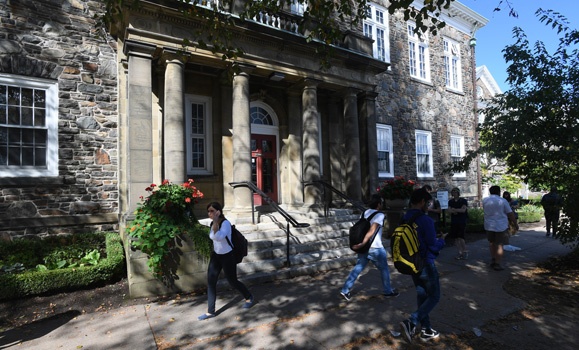A new program launching this fall at Dalhousie seeks to increase access to higher education at the university for youth who have spent time in foster care growing up.
The initiative will offer up to 10 former youth in care tuition waivers for undergraduate studies at Dalhousie, enabling them to attend the university free of tuition charges.
Additionally, the program will provide other tailored institutional wrap-around supports such as advising and counselling as part of a holistic approach to minimizing systemic barriers that disproportionately impact youth with a past in care.
"Former youth in care face unique and multiple barriers to accessing and persisting in post-secondary education," explains Jacqueline Gahagan, the project's coordinator and a professor in the School of Health and Human Performance.
"These youth are hidden among the under-represented marginalized learner groups, including Black, Indigenous and LGBTQ+ within Canadian higher education."
Double the disadvantage
Dr. Gahagan recently published a piece in The Conversation highlighting youth in care’s right to a post-secondary education. The article cites that there are more than 50,000 children who live in foster care in Canada, with many experiencing multiple forms of disadvantage due to poverty, racism, sexism and legacies of colonialism.
The tuition-waiver program aligns well with Dalhousie's broader equity, diversity, inclusion and accessibility goals that aim to broaden and expand programming for historically and currently marginalized groups, says Dr. Gahagan. These groups include Indigenous students (especially Mi’kmaq), students of African heritage (especially Historical African Nova Scotian), those with (dis)abilities (visible and invisible), and 2SLGBTQIA+ youth.
"These groups are over-represented in Nova Scotia’s child welfare system."
Indigenous groups, in particular, are over-represented in the system, with 52 per cent of children in the foster care identifying as Indigenous.
Preparing for the first cohort
There is no age limit for the program, which is now seeking applications for the first cohort of students for the upcoming 2021/2022 academic year. Applicants must have spent at least one year in care to be eligible.
Potential students will be guided through the application process with the support of a member of the project’s working group, which includes individuals from different departments and units across the university.
Individuals awarded a spot in the program are free to pursue a certificate, diploma or degree program at the undergraduate level.
Once accepted, incoming students will receive a robust level of support that covers counselling, advising, accommodations, learning strategies, financial assistance, social connections and coaching.
“University can be intimidating to those unfamiliar with it, so we want to make sure all tuition waiver recipients feel like they have the support they need,” says Kristen Sutherland, associate registrar and director, recruitment and admissions. “It might sound cliché, but there really are no stupid questions. We are here to help.”
Current students or those confirmed in a program that begins in September can apply for the waiver, with application reviews beginning August 23.
Learn more: Eligibility requirements and how to apply.

